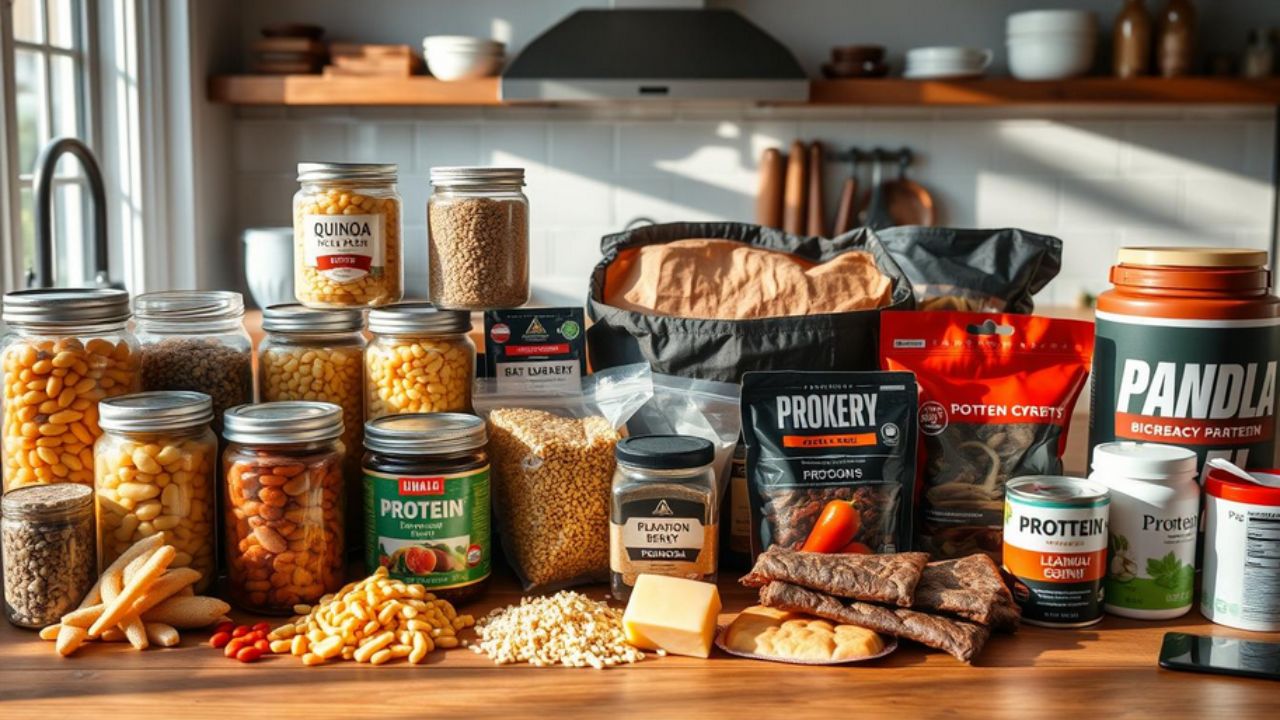Let’s talk about shelf-stable protein sources. If you’re into prepping or just like to be ready for whatever life throws at you, this is something you’ll want to pay attention to.
Protein is what keeps you going when times are tough. It keeps you feeling full and helps you think straight when you need it most.
In this article, we’ll go through 15 shelf-stable protein sources that are worth considering for your emergency supplies.
This list will give you a good starting point.
Remember, the goal here isn’t to become a doomsday hoarder, but to be prepared for whatever life might throw your way. Let’s get into it.
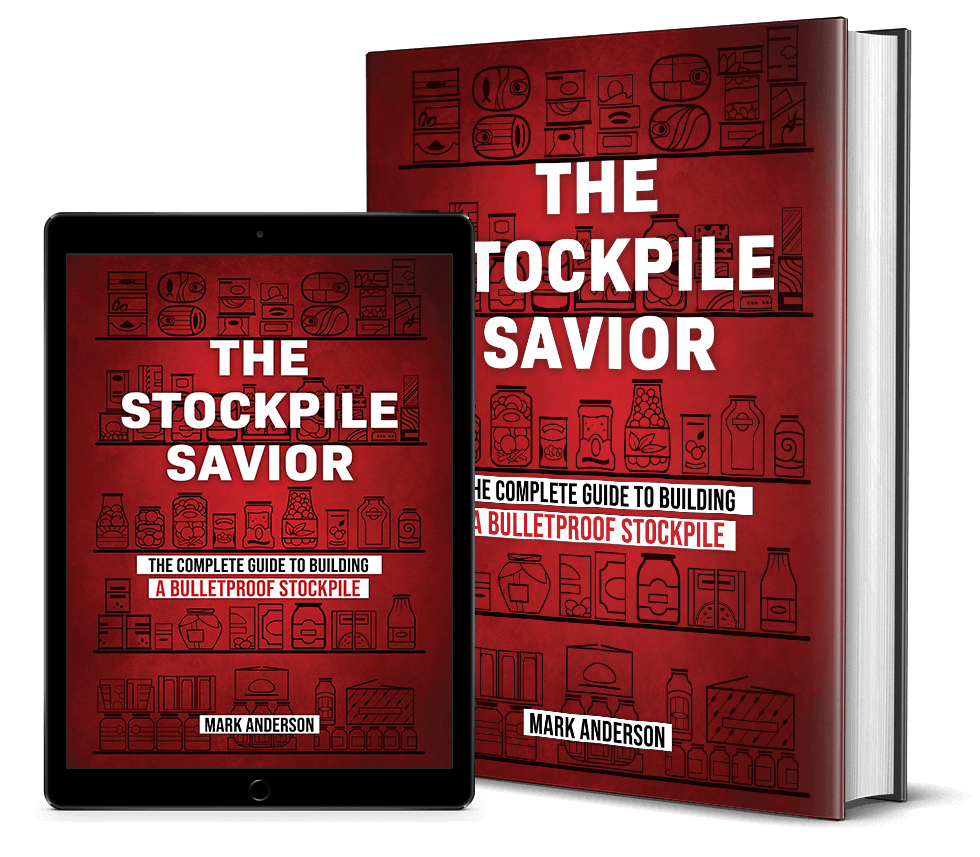
Discover how to build a 100+ days stockpile from scratch, in under 10 days!
This is the ultimate guide to building a bulletproof stockpile that takes you from being uncertain about your preps to being 100% confident that your family will comfortably survive the first 100 days & beyond of any disaster.
Shelf-Stable Protein #1: Protein Powder
Optimum Nutrition Gold Standard 100% Whey Protein Powder
Optimum Nutrition Gold Standard 100% Plant Based Protein Powder
Protein powder is hands down one of the most popular and practical forms of shelf-stable protein.
Whether you’re preparing for emergencies, looking to stock up for everyday convenience, or planning for long-term food storage, protein powder is an excellent choice to meet your nutritional needs.
What makes protein powder stand out is its versatility.
It’s not just a supplement you mix with water; you can add it to a variety of meals, for example:
- You can blend it into smoothies is a common approach.
- You can stir it into oatmeal, pancake batter.
- Or you can even incorporate it into baked goods like muffins or protein bars to give them a nutritional boost.
This flexibility makes protein powder a valuable addition to any pantry, especially for those aiming to maintain their protein intake without relying on perishable items.
However, one thing to keep in mind is that protein powders can sometimes fall short in the taste department.
While some brands offer flavored options like chocolate, vanilla, or strawberry, they don’t always hit the mark for everyone. This is where creativity comes into play; combining protein powder with other ingredients like fruits, almond butter, or even spices like cinnamon can help improve the flavor while also enhancing the nutritional value.
Protein Powder Nutritional Facts
Protein powder is one of the best natural nutritional supplements you can get.
A single serving (usually one scoop) can provide between 18 to 25 grams of protein, depending on the brand and type. This high protein content is key for maintaining muscle mass, especially during times when fresh protein sources might not be readily available.
One of the added benefits of protein powder is that it typically contains all nine essential amino acids, making it a complete protein source.
Amino acids are crucial for muscle repair, recovery, and overall health, particularly after physical exertion or stress.
In terms of calories, you’re looking at approximately 150 calories per serving, which makes it a relatively low-calorie option for such a dense source of protein.
Many protein powders also come with around 7 grams of carbohydrates, a helpful addition for energy, especially when consumed post-workout or during busy days when you need sustained energy.
Overall, protein powder offers a shelf-stable, nutrient-dense, long-lasting protein option that can easily fit into various meals, giving you flexibility and nutrition in a pinch. Just be sure to experiment with flavors and pairings to find combinations that suit your taste.
Shelf-Stable Protein #2: Canned Tuna
Wild Albacore Tuna Fish by American Tuna
Canned tuna is a powerhouse protein source and a must-have for any emergency food stash. It is rich in protein and is packed with essential nutrients, making it a reliable option when fresh food isn’t available.
Canned Tuna Nutritional Facts
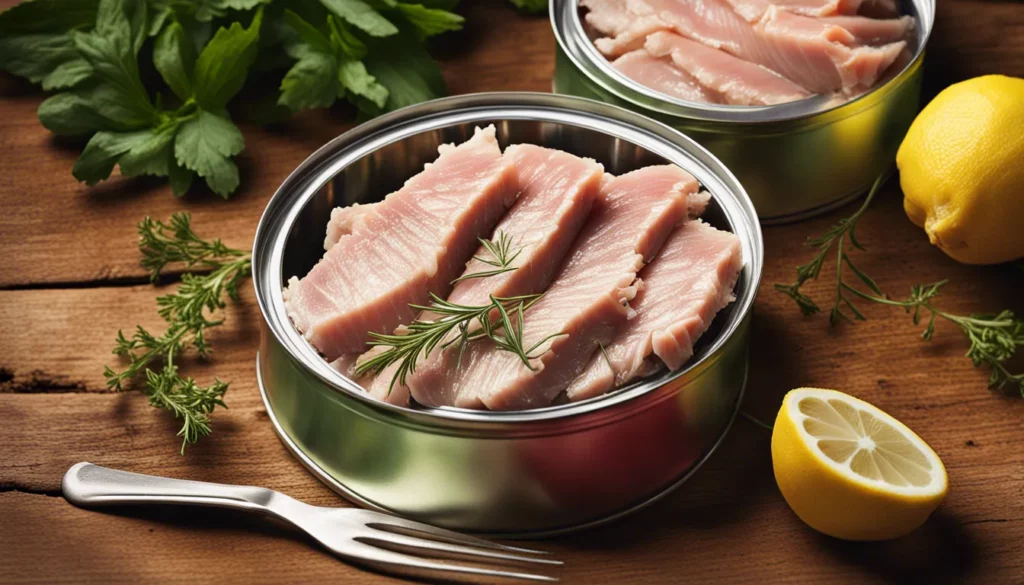
The protein content in a 3-ounce serving of canned tuna is around 20 grams and this high protein content supports muscle maintenance and energy levels.
Canned tuna is not only valued for its high protein content, but it also offers a variety of other important nutrients:
- Omega-3 Fatty Acids: These are essential fats your body cannot produce on its own. These fats are known for their heart health benefits, including reducing inflammation, lowering blood pressure, and decreasing the risk of heart disease. Omega-3s also support brain health and cognitive function, making tuna an excellent choice for overall well-being.
- Vitamin D: This is crucial for bone health by aiding calcium absorption. It also plays a role in immune system function, and in times of limited sunlight exposure, canned tuna can help maintain your vitamin D levels.
- B Vitamins: Tuna is a good source of several B vitamins, especially niacin (B3), which helps convert food into energy, and B12, which is essential for the health of your nerves and red blood cells.
- Selenium: A powerful antioxidant that helps protect cells from oxidative damage and supports immune function. Selenium also plays a role in thyroid hormone production, which regulates metabolism.
- Iron: While not as rich in iron as red meat, canned tuna still provides a moderate amount of iron, which is essential for transporting oxygen in the blood and maintaining energy levels.
- Phosphorus: This mineral is crucial for healthy bones and teeth and plays a key role in how the body uses carbohydrates and fats for energy.
Shelf-Stable Protein #3: Canned Chicken
Survival Cave Food Canned Chicken
Canned chicken is an excellent, protein-rich option for your food storage, especially when fresh meat isn’t readily available. It’s shelf-stable, meaning it can last for years, and its versatility makes it a practical choice for a variety of dishes.
From casseroles to salads and soups, canned chicken easily integrates into many meals, saving you prep time without compromising on nutrition.
Canned Chicken Nutritional Facts

A typical 3-ounce serving of canned chicken contains around 12 to 15 grams of protein, depending on the brand. This makes it a great option for meeting daily protein needs, especially in situations where fresh meat isn’t available.
As for calories, the calorie count in canned chicken is relatively low, making it a good option for those watching their calorie intake.
A 3-ounce serving typically provides 100 to 130 calories. Most of these calories come from protein, with minimal fat content, especially if the chicken is packed in water.
Canned chicken is generally low in fat, especially when compared to other protein sources like red meat.
A serving contains around 1 to 5 grams of fat, depending on whether it’s packed in water or oil. The fat is primarily unsaturated, which is healthier for the heart, but watch out for versions packed in oil as they may increase the fat content.
Canned chicken also contains several essential vitamins and minerals, such as:
- B Vitamins: Canned chicken is a good source of B vitamins like niacin (B3), which helps convert food into energy, and vitamin B6, which supports brain health and red blood cell production.
- Iron: It provides a small amount of iron, which is important for oxygen transport in the blood. A 3-ounce serving usually contains around 4% of the daily value (DV).
- Phosphorus: Canned chicken is also rich in phosphorus, vital for bone health and energy production, contributing about 10-15% of the DV per serving.
- Zinc: Another important mineral found in canned chicken is zinc, which plays a role in immune function, wound healing, and DNA synthesis.

Discover how to build a 100+ days stockpile from scratch, in under 10 days!
This is the ultimate guide to building a bulletproof stockpile that takes you from being uncertain about your preps to being 100% confident that your family will comfortably survive the first 100 days & beyond of any disaster.
Shelf-Stable Protein #4: Canned Salmon
Wild Planet Wild Pink Salmon
Canned salmon is often more affordable than fresh salmon, especially when considering the cost of refrigeration and potential spoilage.
It provides a cost-effective way to incorporate high-quality protein and nutrients of salmons into your diet without breaking the bank.
Canned Salmon Nutritional Facts
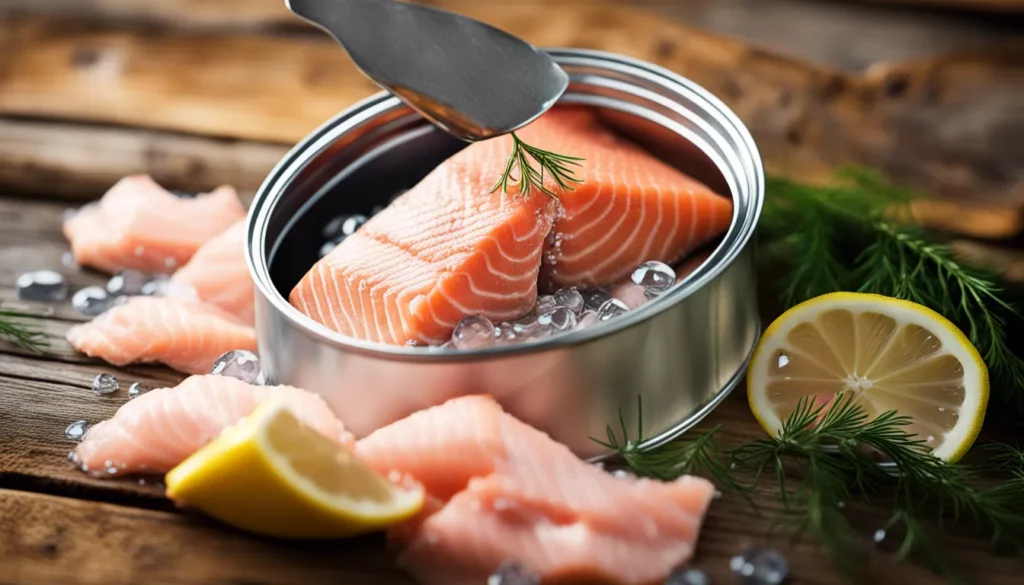
Canned salmon is packed with protein, typically containing around 20 to 25 grams of protein per 3-ounce serving.
Salmon is also renowned for its high levels of omega-3 fatty acids, particularly EPA and DHA.
These healthy fats are known for their anti-inflammatory properties and their role in supporting heart health, brain function, and overall well-being.
Including omega-3s in your diet can be especially beneficial during stressful situations, like emergencies or natural disasters.
In addition to being high in protein and healthy fats, canned salmon is nutrient-dense. It is a good source of vitamins and minerals such as:
- Vitamin D: Essential for bone health and immune function.
- Vitamin B12: Important for nerve health and red blood cell production.
- Selenium: A powerful antioxidant that helps protect cells from damage.
- Calcium: If you choose canned salmon with bones, it can be a source of calcium, which is vital for bone health.
Shelf-Stable Protein #5: Beef Jerky
Hot Teriyaki Brisket Beef Jerky 5 Pound Bag
Beef jerky is a top pick for high-protein snacks, with 7 to 9 grams of protein per ounce. It’s light, easy to carry, and perfect for your emergency kit or any time you need a snack.
While beef jerky can be a nutritious snack, it’s essential to practice portion control due to its calorie density and sodium content. Eating jerky in moderation can help you enjoy its benefits without overdoing it.
Beef Jerky Nutritional Facts

A typical 1-ounce (about 28 grams) serving of beef jerky can provide approximately 9 to 15 grams of protein. This makes it an excellent source of protein for muscle maintenance, repair, and overall health, especially in situations where fresh food may not be readily available.
Beef jerky is generally low in carbohydrates, typically containing 1 to 5 grams of carbs per serving, depending on the flavor and brand, thus making it suitable for low-carb or ketogenic diets, allowing you to enjoy a satisfying snack without impacting your carb intake significantly.
The fat content in beef jerky varies depending on the cut of meat used and whether it has added ingredients.
On average, a serving contains about 3 to 7 grams of fat. This can include both saturated and unsaturated fats.
While some fat is necessary for energy and nutrient absorption, it’s essential to choose jerky made from lean cuts of meat to keep the fat content in check.
Beef jerky is a good source of several essential vitamins and minerals, including:
- Iron: Important for oxygen transport in the blood, beef jerky provides a significant amount of iron, helping to prevent anemia.
- Zinc: This mineral plays a crucial role in immune function and wound healing. A serving of beef jerky can offer about 10% of the recommended daily value.
- B Vitamins: Beef jerky is rich in B vitamins, particularly vitamin B12, which is vital for nerve health and red blood cell production, and niacin (B3), which aids in energy metabolism.
One of the primary concerns with beef jerky is its sodium content.
To enhance flavor and preserve the meat, manufacturers often use salt during the curing process.
A typical serving can contain 500 to 800 milligrams of sodium, which can contribute to high blood pressure if consumed excessively. It’s wise to look for low-sodium options if you’re monitoring your sodium intake.
Beef jerky can be relatively high in calories for a snack food, with a typical serving containing about 70 to 130 calories, depending on the brand and preparation method.
Shelf-Stable Protein #6: Canned Sardines
Brunswick Sardines in Soybean Oil (Pack of 100 Cases)
Canned sardines are a nutritional powerhouse that often gets overlooked.
With their affordable price, you can easily add them to many meals; try tossing them in pasta dishes, adding them to salads, or enjoying them as a snack.
Canned Sardines Nutritional Facts

Canned sardines are an excellent source of protein, typically providing around 20 to 25 grams of protein per 3.75-ounce (106-gram) serving.
One of the standout features of sardines is their high concentration of omega-3 fatty acids, particularly EPA and DHA.
A serving can contain approximately 1,000 to 2,000 milligrams of omega-3s, which are known for their heart health benefits, anti-inflammatory properties, and support for brain health.
Canned sardines are a low-carb food, containing typically 0 grams of carbohydrates per serving, making them an excellent choice for those following low-carb or ketogenic diets.
They are packed with essential vitamins and minerals, including:
- Calcium: If the sardines are canned with their bones, they can provide a significant amount of calcium, essential for bone health. A serving can contain about 25% of the recommended daily value.
- Vitamin D: Sardines are one of the few natural food sources of vitamin D, which is vital for calcium absorption and bone health. A serving can provide about 50% of the recommended daily value.
- Vitamin B12: Sardines are an excellent source of vitamin B12, necessary for nerve health and the formation of red blood cells, providing around 300% of the recommended daily value per serving.
- Selenium: This powerful antioxidant helps protect cells from damage and plays a role in thyroid function.

Discover how to build a 100+ days stockpile from scratch, in under 10 days!
This is the ultimate guide to building a bulletproof stockpile that takes you from being uncertain about your preps to being 100% confident that your family will comfortably survive the first 100 days & beyond of any disaster.
Shelf-Stable Protein #7: Peanut Butter
Augason Farms Peanut Butter Powder
Peanut butter is a popular and versatile food that provides a variety of nutritional benefits, making it a fantastic option for emergency preparedness.
Here’s an in-depth look at the nutritional facts of peanut butter and why it’s a valuable addition to your emergency food supply.
Peanut Butter Nutritional Facts
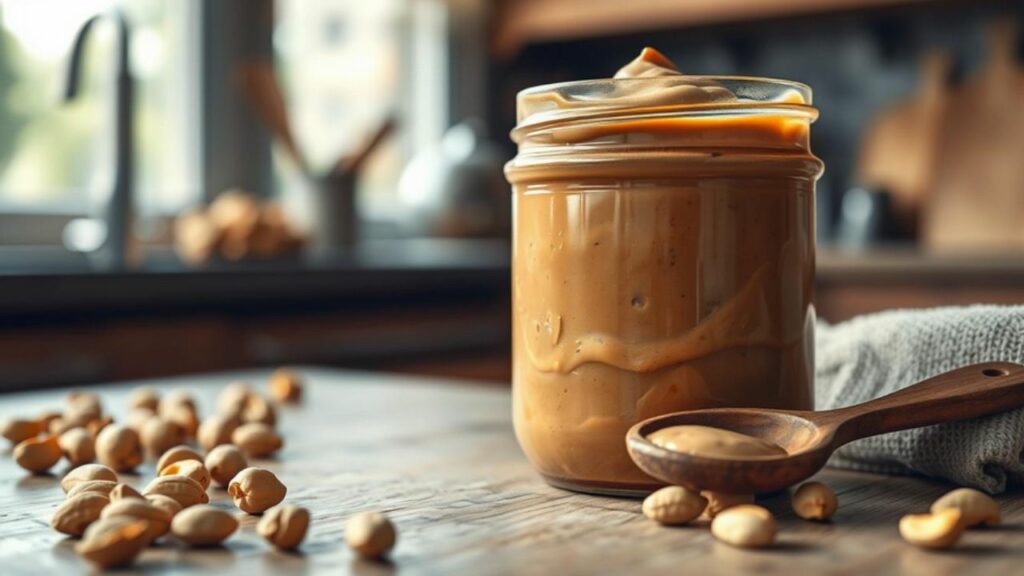
Peanut butter is an excellent source of protein, containing approximately 7 to 8 grams of protein per 2-tablespoon (32-gram) serving.
It is rich in healthy fats, primarily unsaturated fats, with around 16 to 18 grams of fat per serving. These fats can help support heart health by lowering bad cholesterol levels (LDL) and increasing good cholesterol (HDL).
About half of the fat content comes from monounsaturated fats, which are linked to various health benefits.
Peanut butter has a moderate carbohydrate content, typically containing about 6 to 8 grams of carbohydrates per serving.
Most of the carbs come from dietary fiber, which is essential for digestive health. A typical serving may provide around 2 grams of dietary fiber, aiding in digestion and helping to regulate blood sugar levels.
Peanut butter is not only tasty but also packed with essential vitamins and minerals, including:
- Vitamin E: An antioxidant that supports immune function and skin health.
- Magnesium: Important for muscle and nerve function, blood sugar control, and bone health. A serving provides about 10% of the recommended daily value.
- Potassium: Helps regulate blood pressure and fluid balance in the body.
- Phosphorus: Essential for healthy bones and teeth.
Shelf-Stable Protein #8: Powdered Eggs
READYWISE Powdered Eggs Bucket
Powdered eggs are a great substitute for fresh eggs. They can last up to 5-10 years if stored right, which is perfect for emergency food supplies.
Using powdered eggs in your cooking is easy and fun. You can add them to baked goods or mix them with water for a tasty breakfast.
Powdered Eggs Nutritional Facts

Powdered eggs contain approximately 6 grams of protein per tablespoon (about 10 grams of powder).
In a standard serving of two whole eggs (around 1/4 cup of reconstituted powdered eggs), you can expect to receive about 12 to 14 grams of protein.
Powdered eggs are very low in carbohydrates, typically containing about 0.5 grams per serving. This makes them an ideal choice for those following low-carb or ketogenic diets, as they provide essential nutrients without adding significant carbohydrates.
Some essential vitamins and minerals in powdered eggs include:
- Vitamin A: Important for vision, immune function, and skin health.
- Vitamin D: Supports calcium absorption and bone health. A serving of powdered eggs can provide a good amount of this essential vitamin.
- B Vitamins: Includes B2 (riboflavin), B5 (pantothenic acid), and B12, which are important for energy metabolism and neurological function.
- Iron: Supports red blood cell formation and helps transport oxygen throughout the body.
- Selenium: An important antioxidant that helps protect cells from damage.
Shelf-Stable Protein #9: Canned Beans
READYWISE BBQ Beans Bucket
Canned beans are a great choice for preppers. They are packed with protein and fiber, which is good for your health. You can add them to soups, salads, sides, and wraps.
Canned Beans Nutritional Facts
Canned beans are a great source of plant-based protein, providing about 6 to 9 grams of protein per serving.
They are high in dietary fiber, offering approximately 5 to 8 grams of fiber per serving. This fiber content helps promote digestive health, aids in maintaining a healthy weight, and supports stable blood sugar levels.
Canned beans provide complex carbohydrates, usually containing 20 to 25 grams of carbohydrates per serving.
Complex carbohydrates provide sustained energy, making beans a great choice for meals and snacks.
Canned beans are packed with essential vitamins and minerals, including:
- Folate: Important for DNA synthesis and cell division, especially crucial during pregnancy.
- Iron: Essential for transporting oxygen in the blood and preventing anemia.
- Magnesium: Supports muscle and nerve function and helps regulate blood pressure.
- Potassium: Aids in fluid balance and supports heart health.
One consideration with canned beans is their sodium content.
Many canned beans contain added salt for flavor and preservation, which can lead to sodium levels of 300 to 400 milligrams per serving. However, low-sodium or no-salt-added options are often available, allowing you to manage your sodium intake.

Discover how to build a 100+ days stockpile from scratch, in under 10 days!
This is the ultimate guide to building a bulletproof stockpile that takes you from being uncertain about your preps to being 100% confident that your family will comfortably survive the first 100 days & beyond of any disaster.
Shelf-Stable Protein #10: Lentils
Clear Creek Beluga Lentils Emergency Food Storage Bucket
Lentils are a great choice for your emergency food supply. They offer a lot of plant-based protein and important nutrients.
Lentils Nutritional Facts
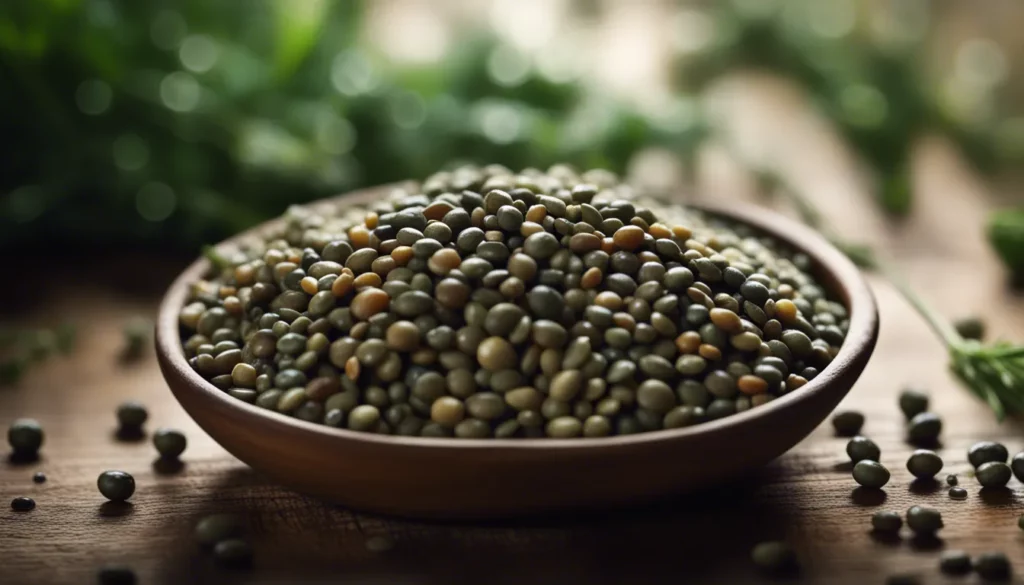
Lentils are an excellent source of plant-based protein, providing about 18 grams of protein per cooked cup (approximately 198 grams). This makes them a fantastic option for vegetarians and vegans looking to meet their protein needs.
They contain essential amino acids, although they are lower in methionine, making it beneficial to combine them with grains for a complete protein profile.
Lentils are particularly high in dietary fiber, offering around 15.6 grams per cooked cup. This fiber content is beneficial for digestive health, helping to regulate bowel movements and promote a feeling of fullness, which can aid in weight management.
The soluble fiber in lentils can also help lower cholesterol levels and stabilize blood sugar.
Lentils are low in fat, containing less than 1 gram of fat per cooked cup and are a great source of complex carbohydrates, offering about 40 grams of carbs per cooked cup.
Complex carbohydrates are digested slowly, providing a steady release of energy, making lentils an excellent choice for sustained energy levels.
Lentils are packed with essential vitamins and minerals, including:
- Iron: Crucial for oxygen transport in the blood, with about 6.6 milligrams per cooked cup, which is about 37% of the recommended daily intake for adults.
- Folate (Vitamin B9): Important for DNA synthesis and cell division, providing about 90% of the recommended daily intake per cooked cup.
- Magnesium: Supports muscle and nerve function, contributing approximately 15% of the recommended daily intake.
- Potassium: Aids in fluid balance and blood pressure regulation.
Lentils are relatively low in calories, with about 230 calories per cooked cup. This makes them a nutrient-dense food that provides a lot of nutrition without excessive calories.
Shelf-Stable Protein #11: Chickpeas
Palouse Brand Dried Chickpeas
Chickpeas or garbanzo beans are a great choice for vegan protein that’s easy to store and come in canned and dried forms, perfect for your emergency pantry.
They’re great in salads, as creamy hummus, or in savory dishes. Many people love them for their versatility.
Chickpeas Nutritional Facts
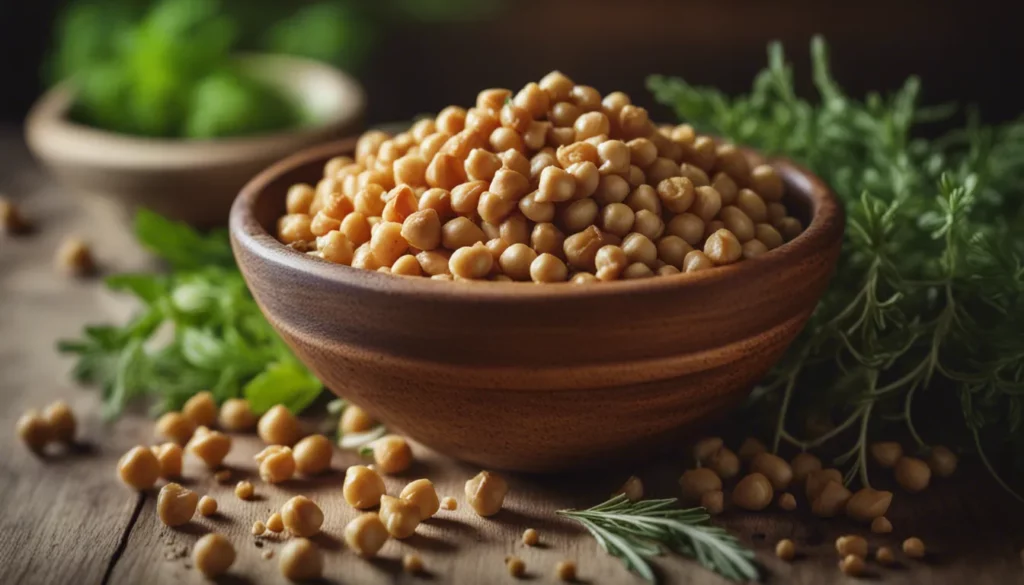
Chickpeas provide about 15 grams of protein per cooked cup (approximately 240 grams) and are rich in complex carbohydrates, offering around 45 grams of carbohydrates per cooked cup.
They are packed with essential vitamins and minerals, including:
- Folate (Vitamin B9): Important for DNA synthesis and repair, making it crucial during periods of rapid growth, such as pregnancy.
- Iron: Essential for red blood cell production and oxygen transport. Chickpeas contain about 4.7 mg of iron per cooked cup.
- Magnesium: Vital for muscle and nerve function, blood sugar regulation, and bone health. A cooked cup of chickpeas contains approximately 80 mg of magnesium.
- Phosphorus: Important for healthy bones and teeth, with about 276 mg per cup.
- Potassium: Helps regulate blood pressure and fluid balance.
Chickpeas are low in fat, with less than 4 grams of fat per cooked cup and are relatively low in calories, containing approximately 269 calories per cooked cup.
Shelf-Stable Protein #12: Quinoa
Royal Organic Tri Color Quinoa
Quinoa is a nutrient-dense, shelf-stable protein source that provides a well-rounded mix of essential amino acids, healthy fats, vitamins, and minerals.
Quinoa Nutritional Facts

Quinoa is often hailed as a “complete protein”, meaning it contains all nine essential amino acids. This makes it an excellent plant-based protein source, comparable to animal proteins, which are typically rich in these amino acids.
One cup of cooked quinoa provides about 8 grams of protein.
Quinoa is naturally gluten-free, making it an excellent option for individuals with gluten sensitivities or celiac disease.
In emergencies, access to specialty gluten-free foods may be limited, so having quinoa on hand ensures those with dietary restrictions have a nutritious option.
Quinoa is rich in carbohydrates, providing about 39 grams of carbohydrates per cup of cooked quinoa. However, these carbs are accompanied by about 5 grams of dietary fiber, which aids in digestion, helps stabilize blood sugar levels, and keeps you feeling full for longer periods.
Some other key nutrients include:
- Magnesium: Quinoa is an excellent source, with about 30% of the daily recommended intake per cup, helping support muscle and nerve function, and blood sugar regulation.
- Iron: Provides about 15% of the daily recommended intake, helping with oxygen transport in the body.
- Phosphorus: Important for bone health and energy storage.
- Folate: Important for cell function and tissue growth, especially beneficial for pregnant women.
- Zinc, Manganese, and Copper: These trace minerals are vital for various bodily functions, including immunity, metabolism, and enzyme function.

Discover how to build a 100+ days stockpile from scratch, in under 10 days!
This is the ultimate guide to building a bulletproof stockpile that takes you from being uncertain about your preps to being 100% confident that your family will comfortably survive the first 100 days & beyond of any disaster.
Shelf-Stable Protein #13: Shelf-Stable Tofu
Mori-Nu Silken Tofu Lite Firm
Shelf-stable tofu is a great choice for those looking for plant-based protein.
Unlike refrigerated or fresh tofu, shelf-stable tofu is packed in aseptic containers, allowing it to last much longer without spoiling.
Shelf-Stable Tofu Nutritional Facts

A standard 100-gram (3.5-ounce) serving of tofu typically contains about 8 to 10 grams of protein.
Tofu is naturally low in carbohydrates, with around 2 to 3 grams of carbohydrates per 100 grams.
It contains a moderate amount of fat, primarily heart-healthy unsaturated fats.
In a 100-gram serving, you’ll find about 4 to 6 grams of fat, mostly from monounsaturated and polyunsaturated fats. These fats are beneficial for heart health and help provide long-lasting energy.
Tofu is a good source of several important minerals, including:
- Calcium: Fortified tofu can provide up to 20% of your daily calcium needs per serving, which is essential for bone health, muscle function, and nerve signaling.
- Iron: Shelf-stable tofu provides about 9 to 15% of the recommended daily intake of iron per serving, depending on the brand. Iron is crucial for producing red blood cells and transporting oxygen throughout the body.
- Magnesium: Tofu contains magnesium, which supports muscle and nerve function, blood sugar regulation, and bone health.
Tofu is naturally rich in several B vitamins, especially B1 (thiamine), B2 (riboflavin), and B6. These vitamins are critical for energy metabolism and overall cell function.
Fortified tofu may also contain vitamin D and vitamin B12, which are important for bone health and neurological function, especially for those on plant-based diets.
Tofu is a relatively low-calorie food, with a 100-gram serving containing only about 70 to 90 calories. This makes it a filling option that provides protein and nutrients without adding too many calories, which can be beneficial during emergencies when portion control is essential.
Shelf-Stable Protein #14:Dry-roasted Edamame
Seapoint Farms Dry Roasted Edamame
Dry-roasted edamame is a nutritious snack made from immature soybeans that have been harvested early, boiled, and then roasted until crunchy.
Originally a popular dish in East Asian cuisine, particularly Japan, edamame has gained worldwide popularity as a healthy snack option.
Dry-roasted Edamame Nutritional Facts

A typical serving (about 1/4 cup or 30 grams) provides 13 to 14 grams of protein, making it an excellent option for vegetarians, vegans, and anyone looking to increase their protein intake.
Soy-based protein, like that in edamame, contains all nine essential amino acids, making it a complete protein.
Edamame is low in fat compared to other protein sources, but it still contains healthy fats.
A serving of dry-roasted edamame typically contains around 4 to 5 grams of fat, with most of this being heart-healthy polyunsaturated and monounsaturated fats.
It also contains a small amount of omega-3 fatty acids, which are beneficial for heart and brain health.
Dry-roasted edamame has a relatively low carbohydrate content, with about 10 to 12 grams of carbs per serving.
Out of this, 5 to 6 grams are dietary fiber, which helps promote healthy digestion, regulate blood sugar levels, and keep you feeling fuller for longer.
Dry-roasted edamame is a great source of various vitamins and minerals, including:
- Iron: One serving contains about 15% to 20% of the recommended daily intake (RDI). Iron is crucial for transporting oxygen in the blood and preventing anemia.
- Magnesium: Provides about 15% of the RDI, supporting muscle function, heart health, and energy production.
- Calcium: While not a massive source of calcium, it offers about 4% to 6% of the RDI, contributing to bone health.
- Potassium: Helps regulate blood pressure and fluid balance.
- Vitamin K: Important for blood clotting and bone health.
Shelf-Stable Protein #15: Protein Bars
No Cow High Protein Bars, Original Variety Pack
Protein bars are a great choice for on-the-go protein needs.
When picking protein bars, choose ones with natural ingredients and less sugar. This supports a healthier diet.
You can find many flavors and types to keep your protein intake fun and varied.
Protein Bars Nutritional Facts
Protein bars usually contain 10 to 30 grams of protein per bar, depending on the brand and formulation.
Common protein sources include whey protein, soy protein isolate, pea protein, casein, and egg whites. This high protein content helps support muscle repair, immune function, and energy production, which is essential during emergencies or physically demanding situations.
Most protein bars provide 20 to 40 grams of carbohydrates, including sugars and fiber.
Some bars are formulated with low-carbohydrate content (e.g., keto-friendly bars) with 5 to 10 grams of net carbs, while others can be quite high in sugar.
High-fiber protein bars may contain 5 to 10 grams of fiber per bar, which supports digestive health and helps regulate blood sugar levels.
The fat content in protein bars ranges between 5 to 15 grams per bar, depending on the ingredients used.
Some are higher in healthy fats, like those containing nuts, seeds, or coconut oil, while others may have higher levels of saturated fats or trans fats, which are less desirable for heart health.
Protein bars generally range from 200 to 400 calories per serving, with high-protein, high-calorie bars often used by athletes to fuel workouts or recover from intense physical activity. These bars can provide a concentrated source of energy in a compact form, which is beneficial when access to food is limited.
Many protein bars are fortified with essential vitamins and minerals such as:
- Calcium: Important for bone health.
- Iron: Crucial for transporting oxygen in the blood.
- Vitamin D: Supports bone health and immune function.
- B Vitamins (B6, B12, folate): Aid in energy production and red blood cell formation.
One of the critical factors to consider in protein bars is their sugar content.
Some bars can contain 20 grams of sugar per serving, while others use artificial sweeteners like sucralose, stevia, or sugar alcohols (e.g., erythritol).
While low-sugar or sugar-free options exist, bars with high sugar content may contribute to blood sugar spikes and energy crashes.

Discover how to build a 100+ days stockpile from scratch, in under 10 days!
This is the ultimate guide to building a bulletproof stockpile that takes you from being uncertain about your preps to being 100% confident that your family will comfortably survive the first 100 days & beyond of any disaster.
Conclusion
Adding shelf-stable protein sources to your food storage is key for emergency readiness. These options make sure you have healthy meals ready, no matter what.
When planning your food storage, pick a variety of high-quality protein sources. Storing these now will help you face any unexpected challenges.

